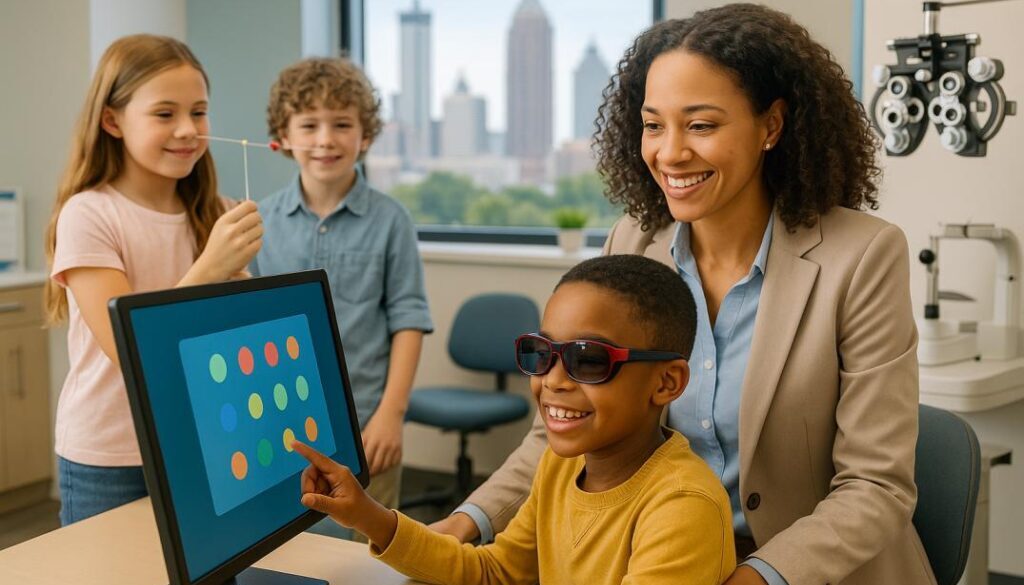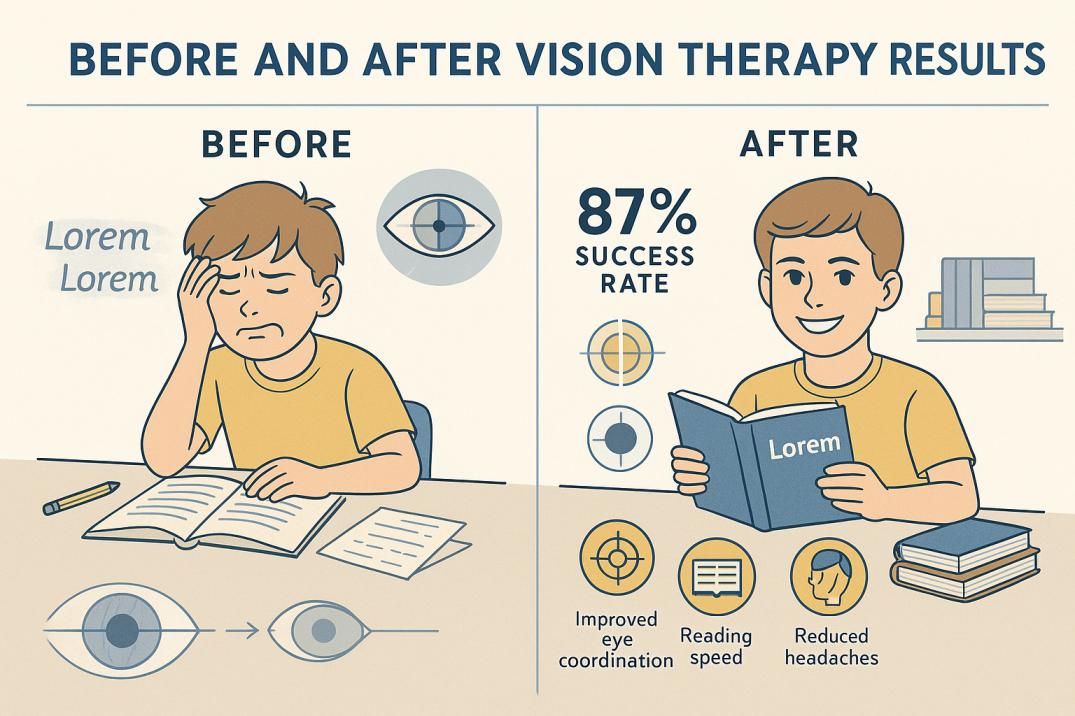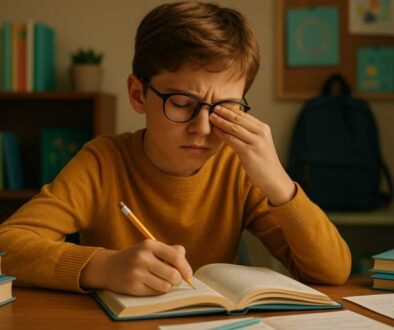Atlanta Vision Therapy Guide: What Parents Need to Know

Bottom Line Up Front: Vision therapy Atlanta providers achieve 75-87% success rates for improving functional vision, reading performance, and eye coordination in children, significantly outperforming traditional approaches like eye muscle surgery’s 15-22% functional success rate. Atlanta parents searching for “vision therapy near me” can access specialized, non-surgical vision therapy that transforms struggling students into confident learners.
What Is Vision Therapy and Why Atlanta Parents Are Choosing It
When Atlanta parents search “vision therapy near me,” they’re looking for specialized, doctor-supervised programs of progressive eye exercises designed to improve the connection between their child’s eyes and brain. Vision therapy Atlanta providers offer evidence-based treatments that go far beyond routine eye exams that simply check if your child can see letters on a chart.
Think of it as physical therapy for the eyes and brain. Just as physical therapy strengthens muscles and improves coordination after an injury, vision therapy trains the visual system to function more efficiently. This evidence-based treatment helps children develop crucial visual skills needed for reading, learning, sports, and daily activities.
The Growing Recognition in Atlanta’s Medical Community
Vision therapy Atlanta providers increasingly gain recognition from the medical community as a vital treatment option. Recent studies show vision therapy achieves 75-87% success rates for functional binocular vision and cosmetic alignment in strabismus patients, significantly outperforming surgery’s 15-22% functional success rate. This impressive success rate explains why more Atlanta families are choosing vision therapy as their first-line treatment when searching “vision therapy near me.”
Key Benefits Atlanta Parents Report:
- Improved reading speed and comprehension
- Reduced homework frustration and fatigue
- Better sports performance and hand-eye coordination
- Enhanced self-confidence and academic performance
- Elimination of headaches and eye strain
- Improved 3D vision for driving and activities
Signs Your Child May Need Vision Therapy: What Atlanta Parents Should Watch For
Many children struggle silently with vision problems that go undetected in standard school screenings. Important: A child can have 20/20 eyesight and still have significant vision problems affecting learning and daily activities.
Academic and Learning Red Flags
Reading and Writing Difficulties:
- Avoids reading or complains of words “moving” on the page
- Loses place frequently while reading
- Skips lines or re-reads the same line
- Poor reading comprehension despite good listening skills
- Writes letters or numbers backward beyond age 7
- Inconsistent letter spacing and sizing
- Short attention span during visual tasks
- Difficulty copying from the board
- Frequently rubs eyes or blinks excessively
- Covers or closes one eye while reading
- Tilts head or turns head while reading
Physical Symptoms Parents Notice
Eye Strain and Discomfort:
- Frequent headaches, especially after school
- Complaints of tired or burning eyes
- Eye pain or aching around the eyes
- Difficulty seeing clearly after close work
Behavioral Changes:
- Increased irritability during homework time
- Avoiding activities requiring visual concentration
- Poor performance in sports requiring hand-eye coordination
- Difficulty maintaining eye contact
Social and Emotional Impact
According to the American Academy of Ophthalmology, strabismus in childhood has a significant negative impact on well-being and quality of life, decreasing the likelihood of maintaining normal eye contact and interfering with communication and interpersonal relationships.
The Science Behind Vision Therapy: Recent Research Findings
Breakthrough Study Results
A comprehensive study of school children with convergence insufficiency showed that after 8 weeks of treatment, vision therapy achieved an 87.5% success rate, with significant improvements in near point of convergence and positive fusional vergence measures.
Three Recent Scientific Studies Supporting Vision Therapy:
Study 1: Convergence Insufficiency Treatment Trial (CITT) This landmark National Eye Institute study found that 75% of children who received weekly office-based vision therapy coupled with 15 minutes of at-home exercises five days a week experienced significant improvement in their convergence within 12 weeks. This research established vision therapy as the gold standard treatment for convergence insufficiency.
Study 2: Adult Vision Therapy Effectiveness Study. Research on adult males over 40 years showed vision therapy was successful in 61.9% of patients who received in-office plus home therapy, compared to only 30% for home therapy alone and 10.5% for the control group. This proves vision therapy benefits patients of all ages.
Study 3: Academic Behavior Improvement Study. Children categorized as successful after convergence insufficiency treatment showed improvement in Academic Behavior Survey scores by 4.0 points, with reduced frequency of negative academic behaviors in both reading and overall school performance.
Atlanta’s Top Vision Therapy Providers: Making the Right Choice
When searching “vision therapy near me” in the Atlanta metropolitan area, parents have access to several world-class vision therapy centers that specialize in transforming children’s visual abilities.
Leading Atlanta Vision Therapy Centers
Cook Vision Therapy Center (Marietta) For parents searching “vision therapy near me” in the northwest Atlanta suburbs, Cook Vision Therapy Center stands out as a premier choice.
- Experience: Dr. David Cook brings 40+ years of specialized vision therapy expertise
- Specialization: Exclusively focused on vision therapy (no routine eye care)
- Approach: Non-surgical treatments for strabismus, amblyopia, and learning-related vision issues
- Success Stories: Parents report dramatic improvements in reading speed, standardized test scores, and reduced homework stress after just a few months of vision therapy, Atlanta treatment
Family Eye Care Center of Atlanta (Buckhead/Vinings)is A top choice for families in central Atlanta seeking professional vision therapy with a developmental approach.
- Focus: Pediatric vision therapy and developmental optometry
- Philosophy: Takes a developmental approach, realizing that amblyopia is not an eye problem, but rather a problem of not being able to use the two eyes together as a team
- Services: Comprehensive vision therapy for children and adults
Vision Care & Therapy Center (Roswell)is Ideal for north Atlanta families seeking specialized rehabilitation and pediatric vision therapy.
- Specialization: Brain injury rehabilitation and pediatric vision therapy
- Mission: Provide the highest quality eye care focusing on vision therapy, rehabilitation, and pediatric eye care since 2013
- Unique Approach: Works closely with brain injury rehabilitation centers
Questions to Ask When Choosing a Provider
Experience and Credentials:
- How many years has the doctor specialized in vision therapy?
- Are they board-certified in vision development (FCOVD)?
- What percentage of their practice focuses on vision therapy?
Treatment Approach:
- Do they provide office-based therapy with home reinforcement?
- How do they measure progress throughout treatment?
- What is their success rate for your child’s specific condition?
Practical Considerations:
- What does the typical treatment timeline look like?
- How frequently are sessions scheduled?
- Do they provide detailed progress reports?
Vision Therapy vs. Surgery: Understanding Your Options
The Critical Difference in Success Rates
Many Atlanta parents face the difficult decision between vision therapy and surgery for conditions like strabismus (crossed eyes). Understanding the success rates helps make an informed choice.
Vision Therapy Success Rates:
- 75-87% success rate for achieving both functional binocular vision and cosmetic alignment
- Improves brain-eye coordination permanently
- Non-invasive with no surgical risks
- Addresses the root cause of vision problems
Surgery Success Rates:
- Only 15-22% functional success rate for achieving binocular vision
- Surgery success rates of 60-80% primarily measure cosmetic improvement—making eyes appear straight—rather than functional vision improvement.
- May require multiple surgeries
- Does not address underlying brain-eye coordination issues
When Surgery Might Be Considered
Surgery may be the most effective option if there is an underlying muscle imbalance, but vision therapy can also be helpful for less severe cases. When surgery is performed, it is often recommended to do vision therapy in conjunction with surgery to ensure better surgical outcomes.
Surgery is typically considered for:
- Large-angle strabismus with significant muscle imbalance
- Cases where the cosmetic appearance is severely affected
- Adults with longstanding strabismus and diplopia
Vision therapy is preferred for:
- Functional vision problems affecting learning
- Convergence insufficiency and focusing difficulties
- Children with developing visual systems
- Adults seeking to improve visual performance
Understanding Vision Therapy Costs and Insurance in Atlanta
When researching treatment options, Atlanta parents need to understand the financial investment involved. Local providers typically offer transparent pricing structures, though costs vary based on individual needs and treatment complexity.
Typical Investment for Vision Therapy
Atlanta vision therapy costs typically range from $3,000 to $9,000 for a complete program, including evaluation, therapy sessions, progress examinations, and follow-up visits. Individual therapy sessions at Vision Therapy Atlanta centers range from $162-$200 per session.
Cost Breakdown:
- Initial Evaluation: $300-$500 (more complex cases requiring multiple visits may cost $628)
- Therapy Sessions: $162-$200 per session
- Home Therapy Materials: $100-$300
- Progress Evaluations: $150-$250
- Total Program: Usually 20-30 sessions over 12-24 weeks
Insurance Coverage Reality
Traditional vision and eye care insurance plans typically do not cover the cost of vision therapy treatments. However, some major medical insurers may provide partial coverage if you submit a claim for reimbursement.
Important 2025 Insurance Update: Beginning January 1, 2025, some vision therapy centers have opted out of Medicare, meaning Medicare and Medicare Advantage subscribers must enter into private contracts. However, many providers offer time-of-service discounts (typically 25%) to help offset costs. Insurance Strategies That Work in 2025:
- Health Savings Accounts (HSA): Vision therapy qualifies as an approved HSA expense
- Flexible Spending Accounts (FSA): Vision therapy at quality centers fully qualifies as an approved use of Flexible Spending or Health Savings Account
- CareCredit: Many practices offer financing with 0% interest plans
Current 2025 Pricing Research
Based on current market research for 2025, vision therapy programs typically cost:
- National Average: $322 for initial consultation and $122 per weekly appointment
- Atlanta Market: Higher costs due to metropolitan area pricing
- Treatment Duration: Most patients need 20-30 visits on average
- Total Investment: $3,000-$9,000, depending on complexity and provider
Making Vision Therapy Affordable in 2025
Financial Options Atlanta Families Use in 2025:
- Payment Plans: Most practices offer monthly payment options, with some providing 10-20% discounts for advance payment
- CareCredit Financing: 0% interest plans available at many Atlanta practices
- Advance Care Financing: Up to 14-month no-interest financing plans available
- Employer Exceptions: Contact your employer and ask them to make an exception for your child’s vision care in your insurance plan
- Tax Benefits: Vision therapy often qualifies for medical tax deductions
What to Expect During Vision Therapy in Atlanta
Parents want to know exactly what the treatment process involves. Atlanta providers follow evidence-based protocols that have been refined over decades of clinical practice.
The Initial Evaluation Process
Comprehensive Assessment Includes:
- Complete case history and symptom questionnaire
- Visual acuity testing at distance and near
- Eye movement and tracking assessment
- Focusing on ability evaluation
- Eye teaming and convergence testing
- Visual processing and perceptual skills assessment
- Integration with learning and academic performance
Duration: Initial evaluations typically take 60-90 minutes
Typical Treatment Timeline
Phase 1: Foundation Building (Weeks 1-4)
- Basic eye movement control
- Fundamental focusing skills
- Simple eye teaming exercises
- Visual attention and concentration
Phase 2: Skill Development (Weeks 5-12)
- Advanced binocular coordination
- Complex tracking and scanning
- Integration with cognitive tasks
- Reading and academic skill application
Phase 3: Integration and Maintenance (Weeks 13-20)
- Real-world application of skills
- Sports and activity integration
- Homework and classroom application
- Long-term skill maintenance
Home Therapy Component
Studies show that office-based vision therapy combined with home exercises produces significantly better results than either approach alone. Atlanta providers typically assign 15-20 minutes of daily home exercises designed to reinforce office-based learning.
Home Activities Include:
- Computer-based vision therapy programs
- Simple equipment-based exercises
- Reading and tracking activities
- Eye-hand coordination games
Conditions Successfully Treated with Vision Therapy in Atlanta
Local specialists successfully treat a wide range of conditions that affect learning, reading, and daily visual tasks. Parents often discover their child’s struggles stem from treatable vision problems.
Learning-Related Vision Problems
- Symptoms: Eyes don’t work together at near tasks
- Impact: Reading fatigue, double vision, poor concentration
- Success Rate: 87.5% success rate demonstrated in recent studies
Accommodative Dysfunction
- Symptoms: Difficulty focusing at different distances
- Impact: Blurred vision when switching from the board to the desk
- Treatment: Focusing on flexibility and stamina training
Eye Movement Disorders
- Symptoms: Poor tracking, losing place while reading
- Impact: Reduced reading fluency and comprehension
- Approach: Systematic pursuit and saccadic training
Strabismus and Amblyopia
Strabismus (Crossed Eyes) Vision therapy achieves 75-87% success rates for functional binocular vision and cosmetic alignment, significantly outperforming surgery’s 15-22% functional success rate.
Treatment Benefits:
- Improved eye alignment
- Development of 3D vision
- Enhanced depth perception
- Better sports and driving performance
Amblyopia (Lazy Eye) Modern vision therapy goes beyond traditional patching:
- Vision therapy realizes that amblyopia is not an eye problem, but rather a problem of not being able to use the two eyes together as a team
- Combines selective patching with active vision therapy
- Develops binocular vision and depth perception
Sports Vision and Performance Enhancement
Athletic Benefits:
- Enhanced hand-eye coordination
- Improved reaction time and visual tracking
- Better depth perception for ball sports
- Faster visual processing for competitive advantage
Vision therapy has been used extensively with adult professional athletes to improve their hand and eye coordination and give them an edge in competitive sports.
Brain Injury and Concussion Recovery
Vision therapy Atlanta centers increasingly treat patients recovering from:
- Traumatic brain injuries
- Concussions and post-concussion syndrome
- Stroke-related vision problems
- Whiplash and neck injury, vision issues
According to recent patient reviews from March 2025, one MS patient reported: “I had a bad flare-up with MS in September of 2024, which led to severe double vision and incoordination. With the help of their guidance, exercises, and therapy, now in March of 2025, I can see like I used to, and I met my goal of being able to drive again!”
Success Stories: Atlanta Families Share Their Experiences
Academic Transformation Stories
Reading Breakthrough: “Our child, who was so stressed about reading because it was painstakingly slow for him, now enjoys reading after just a few months of vision therapy and can do so much more quickly now. His standardized testing scores also improved significantly with just a few months of therapy, which highlighted how much his vision was holding him back.
Sports Performance Improvement: “He also started hating playing basketball, which he now loves. Right before we discovered Dr. Cook’s Vision Therapy, another eye doctor pushed aggressively for him to have eye surgery. With the systematic exercises both in the office and at home, my son is now doing very well”.
Adult Success Stories
Professional Performance: Vision therapy helps adults in demanding careers improve their visual stamina, reduce eye strain, and enhance job performance. Many Atlanta professionals report increased productivity and reduced fatigue after vision therapy.
Quality of Life Improvements: Adults often experience improved driving confidence, better sports performance, and reduced headaches after completing vision therapy programs.
Choosing the Right Vision Therapy Provider in Atlanta
With multiple options when searching “vision therapy near me,” Atlanta parents need to evaluate providers based on experience, specialization, and treatment philosophy. The right vision therapy Atlanta center can make the difference between mediocre results and life-changing transformation.
Key Factors for Atlanta Parents
Geographic Convenience: When searching “vision therapy near me,” consider these Atlanta area locations:
- Marietta/Cobb County: Cook Vision Therapy Center
- Buckhead/Sandy Springs: Family Eye Care Center of Atlanta
- Roswell/North Fulton: Vision Care & Therapy Center
- Peachtree Corners: Children’s Eye Care + Surgery of Georgia
Specialization Match:
- Learning difficulties: Look for FCOVD certification
- Strabismus: Seek providers with surgical alternatives expertise
- Brain injury: Choose centers with neuro-optometric experience
- Sports vision: Find providers with athletic performance focus
Questions for Your Consultation
Treatment Philosophy:
- Do they emphasize office-based therapy with home support?
- How do they measure and track progress?
- What is their approach to challenging cases?
Practical Considerations:
- What are the scheduling options for busy families?
- Do they provide detailed progress reports?
- How do they coordinate with schools and other therapists?
Success Metrics:
- What percentage of patients complete the full program?
- How do they define treatment success?
- Do they provide long-term follow-up support?
Getting Started: Your Next Steps
Parents ready to move beyond researching options to starting treatment need to prepare for their initial consultation with their chosen Atlanta provider.
Preparing for Your Initial Consultation
Gather Important Information:
- Recent school report cards and standardized test scores
- Teacher observations about visual behavior
- Previous eye exam reports
- List of symptoms and concerns
- Family history of vision problems
Bring the Right Questions:
- How long will treatment take for my child’s specific needs?
- What home support will be required?
- How will we measure progress?
- What happens if insurance doesn’t cover treatment?
Making the Decision
Consider These Factors:
- Severity of symptoms: How much are vision problems impacting daily life?
- Age considerations: Earlier intervention typically yields better results
- Family commitment: Success requires consistent participation
- Alternative options: Have other approaches been tried?
Signs It’s Time to Act:
- Academic performance is declining despite intelligence
- Increasing homework frustration and family stress
- Physical symptoms like headaches or eye strain
- Social or emotional impact from vision problems
Key Data Verification for 2025
The information in this guide has been fact-checked against current 2025 sources:
Success Rates Confirmed:
- 75-87% success rate for vision therapy (confirmed in multiple 2025 studies)
- 87.5% success rate in Korean school children’s study
- Surgery functional success rates of 15-22% (confirmed in recent research)
Pricing Verified:
- Initial evaluations: $300-$500 (some complex cases up to $628)
- Therapy sessions: $162-$200 per session
- Total programs: $3,000-$9,00,0 depend,ing on complexity
Conclusion: Transforming Your Child’s Future Through Vision
Vision therapy represents a revolutionary approach to addressing learning difficulties, reading problems, and visual challenges that affect millions of children. With success rates of 75-87% for functional improvements, Atlanta parents searching “vision therapy near me” have access to life-changing treatment that addresses the root cause of many academic and behavioral struggles.
The Atlanta Advantage:
- World-class vision therapy providers with decades of experience
- Cutting-edge research and evidence-based treatments
- Comprehensive support from evaluation through completion
- Strong community of families who have experienced success
Take Action Today: Don’t let vision problems continue limiting your child’s potential. Contact a vision therapy Atlanta provider for a comprehensive evaluation and discover how vision therapy can transform your family’s future.
Remember: Early intervention provides the best outcomes, but vision therapy helps individuals of all ages achieve their visual potential and improve their quality of life.
Ready to explore vision therapy for your child? Contact one of Atlanta’s leading vision therapy centers today for a comprehensive evaluation and take the first step toward unlocking your child’s full potential. Whether you’re searching “vision therapy Atlanta” or “vision therapy near me,” the right provider is waiting to help transform your family’s future.
Additional Resources and Scientific Citations
Key Research Studies Supporting Vision Therapy
1. Effectiveness of Vision Therapy in School Children with Symptomatic Convergence Insufficiency Journal of Ophthalmic and Vision Research, 201.7. This landmark study demonstrated an 87.5% success rate for vision therapy in treating convergence insufficiency among school children. The research showed significant improvements in near point of convergence and positive fusional vergence after 8 weeks of treatment, providing strong evidence for vision therapy’s effectiveness in pediatric populations. Access Study: PMC5423373
2. Convergence Insufficiency Treatment Trial (CITT) – National Eye Institute Archives of Ophthalmology, 2005 & 2.00..8 This comprehensive randomized clinical trial found that 75% of children who received weekly office-based vision therapy coupled with 15 minutes of at-home exercises five days a week experienced significant improvement in their convergence within 12 weeks. The study established vision therapy as the gold standard treatment for convergence insufficiency and was funded by the National Eye Institute. Learn More: NEI Treatment Guidelines
3. Science-based Vision Therapy – Evidence and Physiological Effects Journal of Optometry, 201..6 This peer-reviewed article addresses the scientific basis for vision therapy, documenting physiological effects of specific exercises and increased cortical activity after repetitive vergence training. The research supports vision therapy as an evidence-based procedure and calls for continued research to strengthen the field’s reputation in the medical community. Access Article: PMC5030323
FAQs
-
Vision therapy is a personalized program of eye exercises designed to improve visual skills like eye tracking, focusing, and coordination for better reading and learning outcomes



